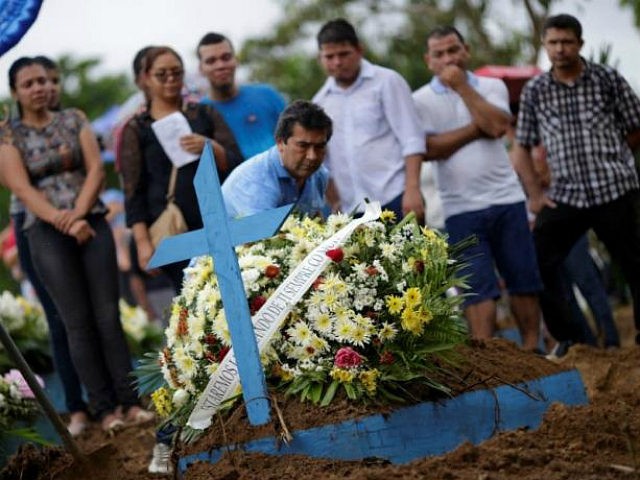The governor of Amazonas, the state in which a prison riot-turned-massacre left over 50 inmates dead, has sparked controversy by dismissing the dead as “not saints” as Brazil’s Justice Minister revealed that authorities had evidence that should have indicated gang members were organizing a riot before it happened.
Brazil’s Justice Minister Alexandre de Moraes said Wednesday that officials in Amazonas possessed evidence suggesting that inmates at the Anísio Jobim penitentiary (Compaj) were “planning an escape between Christmas and New Year’s.” Authorities reportedly “reinforced monitoring of the prison,” according to Moraes.
“There are reports that the Security Secretary had information that an escape could occur, that one was being planned for Christmas or New Year. Precisely because of that, according to local authorities, local security was strengthened and they began monitoring [the prison] day by day,” Moraes said, according to the Brazilian newspaper O Globo. He emphasized, however, that local authorities did not request any help from the federal government to secure the prison. “We learned of [the plot] yesterday or the day before, during meetings we had.” He added that local authorities are not legally bound to tell the federal government when such intelligence comes in.
Reuters cites several security experts corroborating the claim that the rival gangs involved were on the brink of a war related to drug trafficking. 22 members of the gangs in question were killed in October as part of growing tensions.
Police have yet to provide a final tally of the weapons found within the prison or theories as to how the inmates managed to amass enough weapons to successfully execute the riot.
Evidence that the massacre, which left at least 56 inmates dead with an estimated half beheaded, may have been preventable is liable to stir up tensions with the relatives of those deceased or inmates who could have been killed in the riot but have yet to be identified. Family members have been waiting outside Compaj since the events occurred over the New Year holiday, seeking information regarding their loved ones.
Police have yet to identify all the bodies or notify relatives, in part due to the difficulty of matching the bodies with their severed heads. Some bodies were also severely charred, making fingerprint analysis difficult. Acritica — a newspaper based in Manaus, the capital of Amazonas — reports that police have identified 38 of the 56 bodies and released fourteen to family for proper final rites. While they wait, families are subject to the oppressive Amazon summer heat outside the penitentiary and few officials have offered them any information.
“What is happening here is that we don’t have support from anyone,” a woman identified as Regina told the Folha de Sao Paulo. She is waiting for information regarding her son, Igor André Silva de Melo. “Nobody knows, there’s no way of knowing if he is alive or dead.”
Other relatives who spoke to Folha had similar frustrations. Celina Ferreira, whose ex-husband is an inmate at the prison, said he had told a mutual friend he feared for his life before the riot. Now, she says, police have no way of telling her whether he is alive or not.
Those who have received information on their relatives have also been misled. Juliano Neves told O Globo that authorities had informed him his cousin, Luciano Santos, died in the massacre. His family was halfway done with funeral preparations when they were told that Santos had survived and would be transferred out of the prison.
As stories amass of relatives being misled or ignored by authorities, Amazonas Governor José Melo sparked some controversy on Wednesday when asked about the riot on Manaus radio. “There were no saints there,” he said. “They were rapists, murderers… and people tied to gangs who are a minority here in Amazonas.” He added that, despite this, the government had taken measures to protect the survivors, but that without addressing drug trafficking, the threat would persist.
Amazonas Secretary of State for Security Sergio Montes had identified the culprits and victims as members of rival gangs involved in drug trafficking, the Primeiro Comando da Capital (PCC) and Familia do Norte (FDN), though Moraes, the Justice Minister, later contradicted him, stating that most of the victims had no ties to any gang. As most victims had yet to be publicly identified at the time, that claim remains unverified.

COMMENTS
Please let us know if you're having issues with commenting.